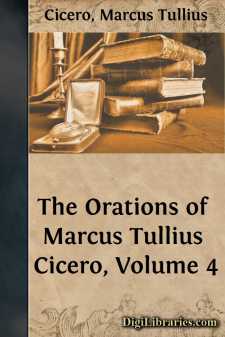Categories
- Antiques & Collectibles 13
- Architecture 36
- Art 48
- Bibles 22
- Biography & Autobiography 813
- Body, Mind & Spirit 142
- Business & Economics 28
- Children's Books 15
- Children's Fiction 12
- Computers 4
- Cooking 94
- Crafts & Hobbies 4
- Drama 346
- Education 46
- Family & Relationships 57
- Fiction 11828
- Games 19
- Gardening 17
- Health & Fitness 34
- History 1377
- House & Home 1
- Humor 147
- Juvenile Fiction 1873
- Juvenile Nonfiction 202
- Language Arts & Disciplines 88
- Law 16
- Literary Collections 686
- Literary Criticism 179
- Mathematics 13
- Medical 41
- Music 40
- Nature 179
- Non-Classifiable 1768
- Performing Arts 7
- Periodicals 1453
- Philosophy 64
- Photography 2
- Poetry 896
- Political Science 203
- Psychology 42
- Reference 154
- Religion 513
- Science 126
- Self-Help 84
- Social Science 81
- Sports & Recreation 34
- Study Aids 3
- Technology & Engineering 59
- Transportation 23
- Travel 463
- True Crime 29
The Orations of Marcus Tullius Cicero, Volume 4
Description:
Excerpt
THE FIRST PHILIPPIC.
THE ARGUMENT
When Julius, or, as he is usually called by Cicero Caius Caesar was slain on the 15th of March, A.U.C. 710, B.C. 44 Marcus Antonius was his colleague in the consulship, and he, being afraid that the conspirators might murder him too, (and it is said that they had debated among themselves whether they would or no) concealed himself on that day and fortified his house, till perceiving that nothing was intended against him, he ventured to appear in public the day following. Lepidus was in the suburbs of Rome with a regular army, ready to depart for the government of Spain, which had been assigned to him with a part of Gaul. In the night, after Caesar's death he occupied the forum with his troops and thought of making himself master of the city, but Antonius dissuaded him from that idea and won him over to his views by giving his daughter in marriage to Lepidus's son, and by assisting him to seize on the office of Pontifex Maximus, which was vacant by Caesar's death.
To the conspirators he professed friendship, sent his son among them as a hostage of his sincerity, and so deluded them, that Brutus supped with Lepidus, and Cassius with Antonius. By these means he got them to consent to his passing a decree for the confirmation of all Caesar's acts, without describing or naming them more precisely. At last, on the occasion of Caesar's public funeral, he contrived so to inflame the populace against the conspirators, that Brutus and Cassius had some difficulty in defending their houses and their lives and he gradually alarmed them so much, and worked so cunningly on their fears that they all quitted Rome. Cicero also left Rome, disapproving greatly of the vacillation and want of purpose in the conspirators. On the first of June Antonius assembled the senate to deliberate on the affairs of the republic, and in the interval visited all parts of Italy. In the meantime young Octavius appeared on the stage; he had been left by Caesar, who was his uncle, the heir to his name and estate. He returned from Apollonia, in Macedonia, to Italy as soon as he heard of his uncle's death, and arrived at Naples on the eighteenth of April, where he was introduced by Hirtius and Pansa to Cicero, whom he promised to be guided in all respects by his directions. He was now between eighteen and nineteen years of age.
He began by the representation of public spectacles and games in honour of Caesar's victories. In the meantime Antonius, in his progress through Italy, was making great use of the decree confirming all Caesar's acts, which he interpolated and forged in the most shameless manner. Among other things he restored Deiotarus to all his dominions, having been bribed to do so by a hundred millions of sesterces by the king's agents, but Deiotarus himself, as soon as he heard of Caesar's death, seized all his dominions by force. He also seized the public treasure which Caesar had deposited in the temple of Ops, amounting to above four millions and a half of our money, and with this he won over Dolabella,[1] who had seized the consulship on the death of Caesar, and the greater part of the army....





